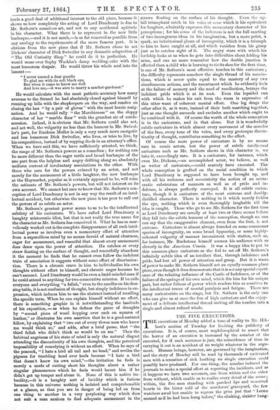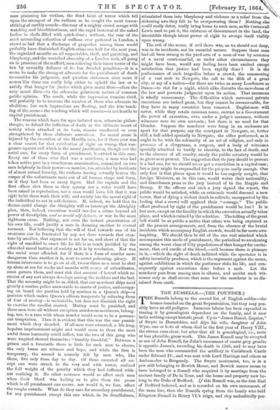TUE FIVE EXECUTIONS.
THE executions of Monday added a tone of reality to Mr. Hib- bert's motion of Tuesday for limiting the publicity of executions. It is, of course, most unphilosophical to assert that the horror of an execution is increased by the number of the executed, for if each sentence is just, the coincidence of time in carrying it out is an accident of no weight whatever in the argu- ment. Human beings, however, are governed by the imagination, and the story of Monday will be read by thousands of cultivated men with a sensation of sick loathing no single execution could possibly have produced. For one thing, the number induced the journals to make.a special effort at reporting the incidents, and as happens we have two accounts, one from within and the other from without, which enable us to realize every detail of the scene ; within, the five men standing with parched lips and unnerved hearts in the bitter cold of the murderers' graveyard, the few watchers awed but unable to repress the grim jest that " Leone seemed as if he had been hung before," the slinking, sinister hang- man pinioning his victims, the dead faint of terror which fell upon the strongest of the ruffians as he caught the most terror- striking of earthly sounds—the roar of a mighty crowd savage with watching and bloodthirstiness, and the rapid bestowal of the naked bodies in shells filled with quick-lime ; without, the roar of the most astounding collection of ruffians ever gathered in London, a crowd so bad that a discharge of grapeshot among them would probably have diminished English crime one-half for the next year, the organized assaults on all respectables, theft, and garotting, and blasphemy, and the wretched obscenity of a London mob, all going on in presence of the scaffold, men relieving their inner terror of the law -by cowardly defiance of its less dreaded penalties,—it is a scene to make the strongest advocate for the punishment of death re-consider his judgment, and question statesmen once more if scenes like these can really help either to uphold the law or to satisfy that hunger for justice which gives moral fibre—often the Only moral fibre—to the otherwise gelatinous nature of common public opinion. The result, while the impression remains vivid, will probably be to increase the number of those who advocate its abolition; but such impressions are fleeting, and the true teach- ing of the scene—the teaching which will remain—is not hostile to capital punishment.
The reasons which have for ages induced men, otherwise philan- thropic, to defend the infliction of death as the ultimate resort of society when attacked at its basis, remain unaffected or even strengthened by these elaborate narratives. No moral sense is injured by the execution of the Manilla men, for if there ever was a clear reason for that retribution of right on wrong, that ven- geance against evil which is the moral justification, though not the social one, for every form of punishment, it existed in this case. Every one of those who died was a murderer, a man who had taken active part in a treacherous assassination, committed on two men helplessly in their power—a murder, too, attended by incidents of almost animal ferocity, the ruffians having actually beaten the corpse of the unfortunate mate out of all human shape and form, as if they had been so many tigers. Had the captain and the first officer shot them as they sprang not a voice would have been raised in reprobation, not a man would have felt that it was right to let them work their will; and society has the moral right of the individual to act in self-defence. If, indeed, we held that its decree could change the Almighty will or intercept the Almighty plan, then, indeed, execution would involve a crime beyond all power of description, and so would self-defence, or war in the most righteous cause. Nothing, not even the instant preservation of his own life, could justify a man in dooming another to eternal torment. Not believing that the will of God towards one of his creatures can be frustrated by any act done towards that crea- ture by another, that argument is not for us, and short of that the right of mankind to exact life for life is as much justified by the educated moral instinct of society as it is by revelation. Nor was the social sense offended, for if there is a form of murder more dangerous than another it is, next to secret poisoning, piracy. If human intercourse is to go on at all, two or three men must be shut up alone at sea for weeks and months with scores of subordinates, must govern them, and must risk that amount of hatred which re- straint of any sort always develops among the reckless and the bad. That the necessity might be modified, that our merchant ships need greatly a marine police answerable to courts of justice, and occupy- ing on board the position held by marines in a Queen's ship—a position which makes Queen's officers temperate by relieving them of fear of mutiny—is undeniable, but does not diminish the right to exercise the needful control. Mutiny must be punished, and these men were all without exception murderous mutineers, belong- ing, too, to a race with whom murder would seem to be a perman- ent temptation. Then it is evident that this was the one punish- ment which they dreaded. If all men were educated, a life-long, hopeless imprisonment might and would seem to them the most awful doom humanity could inflict, but the two of this gang who were respited showed themselves "humbly thankful." Between a prison and a forecastle there is little for such men to choose, the only losses are tobacco and hope, and while the first is temporary, the second is scarcely felt by men who, like these, live only from day to day. Of those executed all ex- cept one were struck to the very soul with terror, realized the full weight of the penalty which they had inflicted with- out realizing it. No other sentence would so affect such men when their blood was boiling as to give them the pause which is all punishment can secure, nor would it, we fear, affect the roughs outside. What do they care for secondary punishment, for any punishment except this one which, in its dreadfulness, stimulated them into blasphemy and violence as a relief from the- sickening awe they felt to be overpowering them ? Nothing else could really deter, really bring home to such men, as Sir Cornewall Lewis used to put it, the existence of Government in the 'land, the irresistible though latent power of right to avenge itself visibly upon wrong.
The evil of the scene, if evil there was, as we should not deny, was in its incidents, not its essential nature. Suppose these men had all been strung to the yard-arm of a man of-war by sentence of a naval court-martial, as under other circumstances they might have been, would any feeling have been excited except satisfaction that justice had been rapidly done ? It is the performance of such tragedies before a crowd, the summoning of a vast mob to Newgate, the call to the filth of a great city, or say of a nation—for there are twice as many Londoners as Danes—to riot for a night, which alike disturbs the sacredness of the law and perverts judgment upon its action. That summons is wholly unnecessary. The difficulties which surround private executions are indeed great, but they cannot be irremoveable, for they have in many countries been removed. Englishmen will never, while they retain common sense, entrust to a Government the power of execution, even under a judge's sentence, without witnesses save its own servants ; but there is no need for that blunder. Suppose the murderer were hung in an enclosure set apart for that purpose, say the courtyard in Newgate, or, better still, a hall added specially to Newgate, the office performed, as it ought to be, with the solemnity of an act of religion, and only in presence of a clergyman, a surgeon, and a body of witnesses specially admitted to testify to identity, to the fact of death, and to the absence of all cruelty, surely the public certainty would be as great as at present. The suggestion that the jury should be present is a bad one, for we should never get a conviction in a capital ease; but a jury might be empanelled for the purpose easily enough. Our only fear is that places upon it would be too eagerly sought, that foreign Ministers, as in this case, would waive their nationality, and Guardsmen press to the jury instead of to the Magpie and Stump. If the officers and such a jury signed the report, the public would be satisfied, while on criminals would descend a new terror, that of dying a violent death in solitude, unsupported by the feeling that a crowd will applaud their "courage." The public effect produced by sight of the punishment would be lost? It is lost now, except on the locality in which the execution actually takes place, and which is ruined by the selection. The tolling of the great bell would be as public a notice that crime was being expiated as all the present arrangements, and, from the absence of the brutal incidents which accompany English crowds, would be'far more awe- inspiring. We should then be rid of the one real mischief which accompanies this mode of punishment, the periodical re-awakening among the worst class of City populations of that hunger for excite- ment, that evil curdle of the blood,—evil because there is pleasure in it, —which the sight of death inflicted while the spectator is in safety invariably produces, which is the argument against the arena, against exhibitions in which the performer risks his life, and con- sequently against executions done before a mob. Let the murderer pass from among men in silence, and amidst such wit- nesses only as shall secure that none but the murderer is so dis- missed from earth.































 Previous page
Previous page